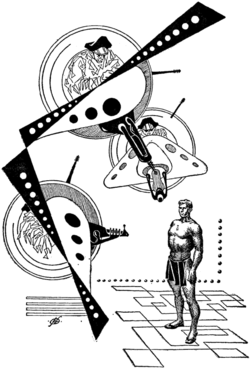
"The Golden Man" is an 11,600-word science fiction short story by American writer Philip K. Dick. It was received by the Scott Meredith Literary Agency on June 24, 1953, and first published in the April 1954 issue of If magazine. [1] The story was illustrated by Kelly Freas in its original publication. [2] The story is set in a post-apocalyptic future where the existence of potentially powerful mutants has become a reality. The mutants are seen as dangerous and have been hunted to death by human beings for years. A golden-skinned mutant called Cris is captured by the government, which attempts to execute him. However, his appearance and abilities to see into the future allow him to escape.